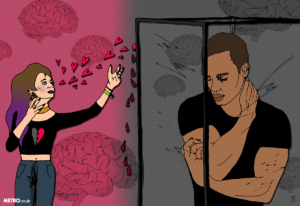Contents
What Is Bipolar Disorder?
 Bipolar disorder is a mental health condition where you experience periods of feeling too high (euphoria) or too low (depression). A person with bipolar disorder has moods that swing from one extreme to another. Bipolar disorder is classified as a serious mental illness, but it can be effectively treated.
Bipolar disorder is a mental health condition where you experience periods of feeling too high (euphoria) or too low (depression). A person with bipolar disorder has moods that swing from one extreme to another. Bipolar disorder is classified as a serious mental illness, but it can be effectively treated.
The severity of the moods can range from mild to severe, and often periods of depression are followed by periods of mania which could also include psychotic features like hallucinations or delusional thoughts.
The length of time that people experience highs and lows varies over their lifetime, but the length typically changes over time, with each episode typically lasting longer than the previous one.
The length of time that people experience highs and lows varies over their lifetime, but the length typically changes over time. The National Institute of Mental Health revealed that episodes are typically the longest when they first start to occur, so this pattern is more common in younger people.
Bipolar Disorder’s Effects On A Person’s Behavior
Bipolar disorder is a mental health condition that affects how one thinks, feels, and behaves. This disorder is also known as manic-depressive illness. The person has swung in mood between manic highs and depressive lows.
Bipolar disorder, also known as manic-depressive illness, is a mental health condition marked by dramatic mood swings.
The illness can cause cycles of depression or mania. Manic behavior can include having too much energy, staying up all night, talking too fast, and taking on many projects at once. Bipolar disorder is a mental health diagnosis that results in extreme mood swings. It can cause cycles of depression or mania. The manic behavior can include having too much energy, staying up all night, talking too fast, and taking on many projects at once.
Depression causes the person to feel sad or hopeless for their future. It can lead to suicide attempts or thoughts of death or self-harm. Depression is a mental health issue that causes the person to feel sad or hopeless for their future. It can lead to suicide attempts or thoughts of death or self-harm.
Tips For Loving Someone With Bipolar Disorder
Here are some tips for loving someone with bipolar disorder in their relationship:

- Get involved slowly and cautiously. Don’t make the mistake of thinking that you can help him or her through every crisis. People with bipolar disorder are notoriously poor self-evaluators. They rationalize risky or illegal behaviors and often don’t feel they need treatment.
- Instead of getting involved, try to be a supportive listener. You could also try talking to them about how much you care about them and want to support them.
- Think about how you’ll handle a crisis situation before it occurs. If your partner is in the manic or hypomanic phase, he or she may not be able to see any problems. In fact, your loved one may insist that everything is fine and refuse to get help.
- Be sure to take care of yourself so you can have the strength to support others. If you are feeling overwhelmed, it’s important to get support from family or friends who understand what you are going through.
- Remember that bipolar disorder often leads to mood swings, impulsivity, and frantic energy.
- Understand how bipolar disorder affects your partner’s sleep patterns, diet, and medication usage.
- Get educated about the different types of bipolar disorder and the treatment options available.
- Educate yourself on how to respond if your partner is experiencing a manic episode or a depressive episode so you know what to do or say when interacting with them.
- Be patient and understanding with your partner as they try to manage their condition and be supportive in the process.
Some other helpful tips you can use for loving someone with bipolar disorder are:
Accept The Condition And Learn About It
Living with a chronic illness can be tough. It is important to accept the condition and learn about it in order to get through the day-to-day challenges.
Some people may feel that they are different from others because of their condition, but that feeling of difference only exists if you make it. Chances are, if you sit down with someone else who has the same condition as you, they will have had some of the same feelings or thoughts.
Therefore, it is essential to talk about your illness with someone who understands what you’re going through and has been there before – preferably your doctor or a close family member.
Listen Without Judgement And Give Them Space To Talk
 In the context of a therapist, this means providing a safe space for discussion and being non-judgemental. It means being receptive to what the client is trying to say.
In the context of a therapist, this means providing a safe space for discussion and being non-judgemental. It means being receptive to what the client is trying to say.
It takes time for people to open up about their trauma or other issues that they are dealing with. The first session itself might not yield much progress unless the person has either come prepared with some notes or has done some research on you beforehand.
The following tips can help therapists maintain good rapport with their clients:
– Maintain eye contact, posture, and respect
– Use active listening techniques like paraphrasing and reflecting back on what you heard them say
– Remember that this form of communication relies on both parties understanding what the other is trying to communicate. If you are not sure what the person is trying to say. Then try to ask questions or offer your thoughts.
Do Not Invalidate Your Loved One’s Emotions
Invalidating your loved one’s emotions is a sure way to hurt them. Invalidation of feelings – which means that another person tries to tell you that you are wrong about what you are feeling – is often done with the best of intentions, but it can be devastating to someone who is already struggling with mental illness or mental health issues.
Keep Yourself Healthy And Centered
Healthy people are better equipped to take care of themselves and others.
The healthiest people have a strong connection to their own well-being, which allows them to have a positive impact on the well-being of others.
Loving someone with bipolar disorder can be hard but loving yourself is equally important. That’s how you will be able to help your loved ones.
How Bipolar Disorder Affects People’s Relationships?
 It can be difficult to stay in love with someone who has bipolar disorder. Here are some things you should know before committing your time and energy to a relationship with someone who has bipolar disorder.
It can be difficult to stay in love with someone who has bipolar disorder. Here are some things you should know before committing your time and energy to a relationship with someone who has bipolar disorder.
Bipolar Disorder is a condition that causes unusual shifts in mood, energy, activity levels, and the ability to carry out day-to-day tasks. People with bipolar disorder have extreme highs (mania or hypomania) and lows (depression).
The mania phase can result in impaired judgment leading to risk-taking behavior such as excessive spending or unsafe sex. It’s not uncommon for people with bipolar disorder to get divorced over money issues but this is certainly not the case in every relationship where one partner has bipolar disorder.
Professional diagnosis of bipolar disorder can take months because the mania phase of the illness mimics other mental health conditions, such as attention deficit disorder (ADD), obsessive-compulsive disorder (OCD), and others.
If your partner exhibits manic-like behavior, it’s wise to get involved slowly and cautiously. Don’t make the mistake of thinking that you can help him or her through any crisis. People with bipolar disorder are notoriously poor self-evaluators. They rationalize risky or illegal behaviors and often don’t feel they need treatment.
Handling Crisis With Bipolar Disorder Patient

1) It’s important to consider how you’ll handle a crisis situation before it occurs. If your partner is in the manic or hypomanic phase, he or she may not be able to see any problems. In fact, your loved one may insist that everything is fine and refuse to get help.
2) It’s best to get involved slowly and cautiously. Don’t make the mistake of thinking that you can help him or her through any crisis. People with bipolar disorder are notoriously poor self-evaluators. They rationalize risky or illegal behaviors and often don’t feel they need treatment.
3) Professional diagnosis of bipolar disorder can take months because the mania phase of the illness mimics other mental health conditions, such as attention deficit disorder (ADD), obsessive-compulsive disorder (OCD), and others.
4) Don’t make the mistake of thinking that you can help him or her through any crisis. People with bipolar disorder are notoriously poor self-evaluators. They rationalize risky or illegal behaviors and often don’t feel they need treatment.
5) Think about how you’ll handle a crisis situation before it occurs. If your partner is in the manic or hypomanic phase, he or she may not be able to see any problems.
6) Don’t make the mistake of thinking that you can help him or her through any crisis. People with bipolar disorder are notoriously poor self-evaluators.
Diagnosis Of Bipolar Disorder
 If you love someone with bipolar disorder, there are a few things that you should consider about its diagnosis. These are-
If you love someone with bipolar disorder, there are a few things that you should consider about its diagnosis. These are-
– Professional diagnosis of bipolar disorder can take months because the mania phase of the illness mimics other mental health conditions, such as attention deficit disorder (ADD), obsessive-compulsive disorder (OCD), and others.
– If your partner is in the manic or hypomanic phase, he or she may not be able to see any problems. In fact, your loved one may insist that everything is fine and refuse to get help.
– Instead of getting involved, try to be a supportive listener. You could also try talking to them about how much you care about them and want to support them.
It can be hard to love someone with bipolar disorder. If you have a loved one who suffers from bipolar. It’s important that they know how much of an impact their diagnosis has on your life and theirs. The most loving thing you can do is encourage them. Especially when they’re in the low moments and remind them that this too shall pass. When things are going well for your loved ones, don’t forget to praise them like crazy. Loving somebody with bipolar isn’t easy but we hope these tips will help make it easier on both parties involved.
A Word From MantraCare
Your mental health — your psychological, emotional, and social well-being — has an impact on every aspect of your life. Positive mental health essentially allows you to effectively deal with life’s everyday challenges.
For more information, please contact MantraCare. Bipolar disorder is a mental illness characterized by extreme shifts in mood, energy, and activity levels. If you have any queries regarding Online Bipolar Disorder Counseling experienced therapists at MantraCare can help: Book a trial Bipolar Disorder therapy session


